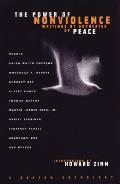 The eleventh chapter of The Power of Nonviolence: Writings by Advocates of Peace contains Albert Camus‘ 1946 essay Neither Victims nor Executioners. This week we discuss the last part of the essay, Toward Sociability. Camus wrote this 16-page essay as World War II had just ended, and it seemed as if the Soviet Union and the United States were dragging the planet into the horrors of a third world war. Eleven years later, he would win the Nobel Prize for Literature.
The eleventh chapter of The Power of Nonviolence: Writings by Advocates of Peace contains Albert Camus‘ 1946 essay Neither Victims nor Executioners. This week we discuss the last part of the essay, Toward Sociability. Camus wrote this 16-page essay as World War II had just ended, and it seemed as if the Soviet Union and the United States were dragging the planet into the horrors of a third world war. Eleven years later, he would win the Nobel Prize for Literature.
Before anyone gets distracted by sociability being a homophone for socialism, this section is about being in conversation. If you have followed along with the prior posts discussing the the earlier section of this essay, then you know that Camus equally discards capitalism and socialism as being murderously Utopian — or Dystopian.
Camus steps away from the cold logic of his argument to dicsuss the place of emotion. He finds that emotions has a place as a motivating force, but not to the effect that it distorts the goals of a nonviolent society:
But I should not want to leave the impression, in concluding, that any programme for the future can get along without our powers of love and indignation.
Camus reinforces the choice between the current murderous world and a world where killing is not acceptable. He understands that there is a cost to being a pcifist in a world where killing is the norm:
I think that I must speak out, that I must state that I will never again be one of those, whoever they be, who compromise with murder, and that I must take the consequences of such a decision.
Camus does not leave out any nation or political system in his condemnation, but he refuses to falling into the rap of hating any particular people or nation. He turns his energy toward the attitudes that we must avoid and those that we must support:
Yes, it is fear and silence and the spiritual isolation they cause that must be fought today. And it is sociability (‘le dialogue’) the universal intercommunication of men that must be defended.
Camus sums up to find that the forces of violence that were psuhing the world toward a third world war will only leave us diminished.
Since these forces are working themselves out and since it is inevitable that they continue to do so, there is no reason why some of us should not take on the job of keeping alive, through the apocalyptic historical vista that stretches before us, a modest thoughtfulness which, without pretending to solve everything, will constantly be prepared to give some human meaning to everyday life.
Camus asks us to reflect on the use of killing to move national goals forward — whether we do the killing ourselves or are accomplices by justifying it. He states that it is important that we understand how to delineate these. Camus is under no illusion that he is fighting against strong forces of human nature and history, but anything less would be cowardice.
And henceforth, the only honourable course will be to stake everything on a formidable gamble: that words are more powerful than munitions.
Related articles
- Albert Camus’ Neither Victims nor Executioners: Century of Fear (peacecouple.com)
- Camus’ Neither Victims nor Executioners: A New Social Contract (peacecouple.com)
- Camus’ Neither Victims nor Executioners: The World Speeds Up (peacecouple.com)
- Camus’ Neither Victims nor Executioners: International Democracy and Dictatorship (peacecouple.com)
- Camus’ Neither Victims nor Executioners: Parody of Revolution (peacecouple.com)
- Albert Camus’ Neither Victims nor Executioners: The Self-Deception of Socialists (peacecouple.com)
- Saving Our Skins: Camus’ Neither Victims nor Executioners (peacecouple.com)

